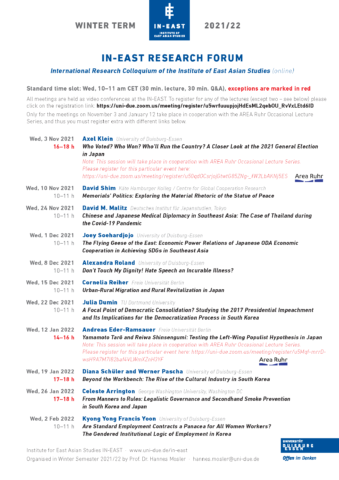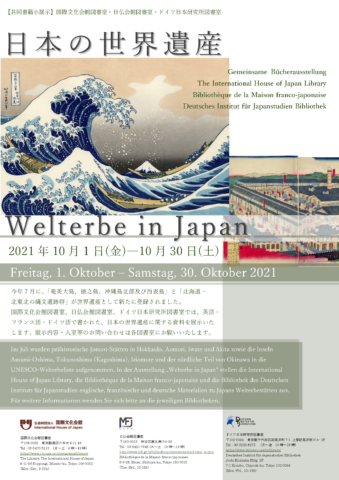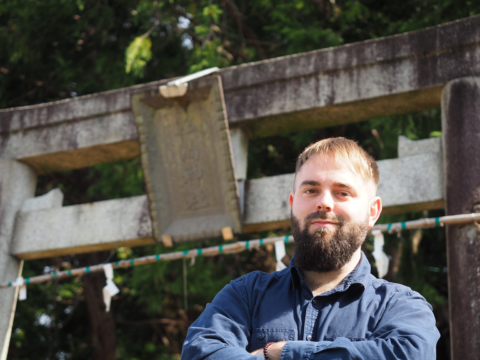イベント&アクティビティ
Talk by David M. Malitz on Chinese and Japanese Medical Diplomacy in Thailand

DIJ senior research fellow David M. Malitz will be the next speaker in the IN-EAST Research Forum Lecture Series at the University of Duisburg-Essen on November 24. His online talk “Chinese and Japanese Medical Diplomacy in Southeast Asia: The Case of Thailand during the Covid-19 Pandemic” will compare Chinese and Japanese medical diplomacy in Thailand and attempt a first analysis of their reception by the Thai public. The last decade saw an intensifying competition for influence between the People’s Republic of China and Japan in Southeast Asia. Since the outbreak of the Covid-19 pandemic, this rivalry has extended to the field of medical or health diplomacy, the donation of equipment, drugs and especially vaccines. Thailand offers an interesting case study in this regard as the kingdom enjoys close relations with both China and Japan. Details and registration here
Film screening and discussion with filmmaker Thomas Ash: ‘Ushiku’ – fully booked –
 In cooperation with the Friedrich-Ebert-Foundation and the OAG Tokyo, the DIJ organizes a special preview screening of the film Ushiku on November 19, ahead of its Japan theatrical release. The screening at the OAG House Tokyo will be followed by a discussion with director Thomas Ash, several protagonists, and human rights expert Ai Kihara-Hunt (University of Tokyo). The film takes viewers deep into the psychological and physical environment inhabited by foreign detainees in one of the largest immigration centres in Japan. On the eve of Japan’s recent immigration reform efforts, the director bypasses the media blackout the government has imposed on its immigration centres, bringing viewers into immediate contact with the detainees, many of whom are refugees seeking asylum. The event will be moderated by DIJ principal researcher Nora Kottmann. Please note: Due to the COVID-19 pandemic special rules for attendance apply. This event is fully booked. We regret that registration is no longer possible. Details here
In cooperation with the Friedrich-Ebert-Foundation and the OAG Tokyo, the DIJ organizes a special preview screening of the film Ushiku on November 19, ahead of its Japan theatrical release. The screening at the OAG House Tokyo will be followed by a discussion with director Thomas Ash, several protagonists, and human rights expert Ai Kihara-Hunt (University of Tokyo). The film takes viewers deep into the psychological and physical environment inhabited by foreign detainees in one of the largest immigration centres in Japan. On the eve of Japan’s recent immigration reform efforts, the director bypasses the media blackout the government has imposed on its immigration centres, bringing viewers into immediate contact with the detainees, many of whom are refugees seeking asylum. The event will be moderated by DIJ principal researcher Nora Kottmann. Please note: Due to the COVID-19 pandemic special rules for attendance apply. This event is fully booked. We regret that registration is no longer possible. Details here
Franz Waldenberger moderates digital currencies panel at virtual GoN-summit

DIJ director Franz Waldenberger will moderate the panel “Digital Currencies – European and Japanese Initiatives” at the Group of Nations ‘Solutions through Inclusivity’ virtual summit on November 17. Together with panelists Andrea Pinna (ECB), Jonas Gross (Frankfurt School Blockchain Center), Hiromi Yamaoka (Future Corporation), and Nobuyuki Kinoshita (Tokyo Financial Exchange), he will discuss how digital currencies are changing the future of financial systems in the digital age. The panel will introduce major findings of the open access book publication The Future of Financial Systems in the Digital Age: Perspectives from Europe and Japan, edited by Markus Heckel and Franz Waldenberger. It is forthcoming from Springer Singapore in 2022 and contains chapters by leading scholars, policymakers, and regulators from Japan and Europe, including the editors as well as panelists Jonas Gross, Hiromi Yamaoka, and Nobuyuki Kinoshita. Registration for the virtual summit is open here
Joint book exhibition ‘World Heritage in Japan’ in October
 Japan is home to no less than 25 UNESCO World Heritage sites, including Himeji Castle, Hiroshima Peace Memorial, and Mount Fuji. In July, two new sites in Japan were added to this list: the first comprises Amami-Oshima Island, Tokunoshima Island, northern part of Okinawa Island, and Iriomote Island (Kagoshima and Okinawa prefectures); the second are Jomon Prehistoric Sites in Northern Japan (Hokkaido, Aomori, Iwate, and Akita prefectures). In this year’s joint autumn book exhibition, the International House of Japan Library, the Bibliothèque de la Maison franco-japonaise , and the DIJ’s library are displaying English, French, and German materials on Japan’s World Heritage sites. The exhibition takes place from October 1st to October 30th. For further information, please contact each library. Details here
Japan is home to no less than 25 UNESCO World Heritage sites, including Himeji Castle, Hiroshima Peace Memorial, and Mount Fuji. In July, two new sites in Japan were added to this list: the first comprises Amami-Oshima Island, Tokunoshima Island, northern part of Okinawa Island, and Iriomote Island (Kagoshima and Okinawa prefectures); the second are Jomon Prehistoric Sites in Northern Japan (Hokkaido, Aomori, Iwate, and Akita prefectures). In this year’s joint autumn book exhibition, the International House of Japan Library, the Bibliothèque de la Maison franco-japonaise , and the DIJ’s library are displaying English, French, and German materials on Japan’s World Heritage sites. The exhibition takes place from October 1st to October 30th. For further information, please contact each library. Details here
DIJ lecture on the dissemination of contemporary Shugendō

In recent years there has been an increasing interest in Shugendō, a syncretic religion based on mountain worship and ascetic exercises. Various practicing groups across the country are expanding beyond their sanctuaries and gather in social networks, even creating new structures and international groups and practicing outside of Japan. The scope of Shugendō’s discourse and practice has expanded to a larger public, thereby attaching Shugendō to the popular belief in so-called “power spots”. Behind this growing popularity might be an interest in a “world invisible to the eyes” (Roth, 2019), in which worldly conflicts and individual concerns may be solved detached from rationalism. This lecture will explore to what extent Shugendō has been rematerialized and staged in the course of its popularization. Does Shugendō, as some scholars claim, represent an “embodiment of Japanese culture” that is worth spreading? Details and registration here
Speaker:
Josko Kozic, Heidelberg University
Sixth Web Forum ‘DT’ introduces Digital Humanities projects

The sixth and last session of our MWS Web Forum Series ‘The Digital Transformation’ on November 4 will introduce six Digital Humanities (DH) projects from different institutes within the Max Weber Foundation. Harald Kümmerle (DIJ) will give a talk on “Datafication as observed in speeches in the Japanese Diet – an analysis using topic modelling”. Esther Meier and Sebastian Kindler (German Historical Institute Moscow) will introduce the German-Russian documentation and digitisation project “Soviet and German Prisoners of War and Internees”. Jörg Hörnschemeyer (DHI Rome) will give an overview of DH at the German Historical Institute in Rome. Mareike König (German Historical Institute Paris) will introduce “Academic blogging in the humanities” using the example of the platform de.hypotheses. Anne Klammt (DFK Paris) will give a talk on the “Deutsch-Französische Kunstvermittlung 1871–1940 & 1945–1960” and Jana Keck (German Historical Institute Washington) will introduce “Semi-Automated Genre Classification for Historical Newspapers”. Details and registration here
Fifth Web Forum Series ‘DT’ session on History and the Digital Age

Andreas Fickers (Luxembourg Centre for Contemporary and Digital History) will be the speaker in the fifth session of our MWS Web Forum Series ‘The Digital Transformation’ on October 28. His presentation “What the D does to History – The Digital Age as a New Historical Time Regime?” will focus on the interface between theory and practice, conceptual penetration and methodological reflection of historical scholarship in the digital age. It will discuss the tensions between a discipline based on 19th century methodological foundations and the radically changing knowledge economy of the 21st century. These tensions force historians to rethink and adapt central concepts and practices of thinking and doing history – including the question of the temporal regime of the digital which will be at the heart of this lecture. Details and registration here
Fourth Web Forum Series ‘DT’ session on the Future of Society

Yuko Harayama (RIKEN), Dietmar Harhoff (Max Planck Institute for Innovation and Competition), and Ulrike Schaede (University of California San Diego) will be the speakers in the fourth session of our MWS Web Forum Series ‘The Digital Transformation’ on October 21. Its focus will be on ‘The Future of Society – National Ambitions and Strategies’. Yuko Harayama’s paper “How to use ‘Society 5.0’?” will introduce the concept and explain its use in Japan and the interest it has attracted abroad. In his presentation “Reconsidering German National Strategies towards Digitalization”, Dietmar Harhoff will focus on the government’s strategic plan ‘Industrie 4.0′, its national AI strategy, and initiatives to accelerate the digitalization of the public sector. Ulrike Schaede’s paper “National Differences in Preparing for the Digital Disruption: Markets v. Industrial Policy” will compare Japan’s reliance on industrial policy, the US’ focus on markets and private initiatives, and Germany’s in-between position. Details and registration here

















 Open Access
Open Access
